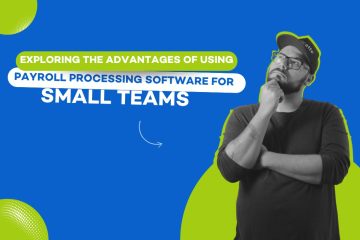Introduction
A key duty of business owners involves managing payroll. The hr payroll software helps employers reward employees, including staff, workers, and laborers, for their contributions and performance over the past month. Payroll Processing System includes calculating basic salary, various allowances, incentives, variable pay, leaves, performance evaluations, taxes, and bonuses for each employee. Payroll Processing System also involves determining the amount to be withheld for taxes, provident fund (PF), pension, and various other deductions.
Processing payroll falls under human resource management and is typically executed by a company’s HR professionals. Payroll processing software ensures that employees receive fair and transparent compensation and assists the company in complying with local and state laws.
Payroll processing systems can be automated or manual and vary in each organization. Some companies have a specific department to manage and administer payroll internally, many delegate the duty to the human resource team, and other companies may use a payroll processing software system to automate the entire process. Automated payroll eliminates human errors, processes payments much faster, and requires minimal monitoring and user intervention.
What are the Basic Steps Involved in Payroll Processing?
A company might have full-time and part-time employees, consultants, freelancers, and seasonal employees. Payroll processing helps track and calculate the different wages based on the payroll cycle for each type of employee.
For example, the payroll cycle differs between freelancers and full-time employees. All full-time and part-time employees work on the company’s payroll. Like regular employees, they are eligible for compensation, holidays, bonuses, and benefits. They usually have a 30-day payroll cycle. At the same time, most freelancers and consultants have a shorter payroll cycle, like monthly, biweekly, or weekly.
The basic steps of payroll processing are as follows:
- Payroll Policy:Determine a payroll policy between your company and the employee. It may consist of instructions on how the salary is calculated, what’s the payroll cycle, and mandatory deductions for each employee.
Depending on your company’s norms, the payroll policy may include other details, such as paid and unpaid leaves, the request time-off process, the workweek definition, and the wage structure.
- Statutory Compliance:You must comply with statutory payroll regulations. For instance, in India, a company must follow the Minimum Wages Act and Maternity Act.
- Employee Information:Gather employee information for tax deductions. This includes PAN details and other employee forms. Validate the information before proceeding forward.
- Payment Method:Determine how to pay the employees—direct deposit, cheque, DD, or cash in hand. For direct deposit, you may have to collect employee bank account details. Many businesses require their employees to open a salary account with the same bank where the company holds an account to simplify the payment clearance process.
- Hire Manager:Appoint a human resource manager who will be responsible for tracking, calculating, and distributing payments based on the payroll system. You can also consider implementing the fully automated payroll processing software developed by the best web development company in Delhi, DI Infotech.
- Calculation and Initiation:Calculate payroll for each employee or worker using the formula set up for payment calculation. There are two types of compensation – gross pay or CTC and net pay or take-home salary. Gross pay is an employee’s salary before any deductions, like income tax, PF, pension, medical insurance, leaves, etc. Once the deductions are applied, schedule to credit the salary on payday.
- Payroll Auditing:Payroll auditing is important to ensure the payroll process is accurate and effective. It can happen frequently, quarterly, or yearly. Maintain a detailed payroll record, especially if your company pays employees in cash or you offer different types of employees.
What is a Payroll Processing System Software?
Payroll processing software is a cloud-based or on-premise digital solution that automates the entire process, right from tracking salary through calculating taxes to scheduling payments. A robust and integrated software solution from the best web development company in Delhi can also help you automate enrollment, maintain historical payment records, and ensure spotless compliance.
DI Infotech’s HR and Payroll software system is an integrated solution that offers comprehensive features to streamline and automate the entire HR and payroll process, ensuring maximum efficiency and minimum errors.
Why Should You Integrate a Payroll Processing System?
- Removes Manual Salary Processing:The software can effortlessly merge with your current HR database, removing the necessity for manual input and verification.
- Automates Process from Start to Finish: The software automates the entire payroll process, including salary calculations, taxes, deductions, allowances, bonuses, and contributions.
- Effortlessly Updates Data: Adjustments to employee details, including promotions, resignations, and changes in salary, can be automatically updated in payroll computations.
- Apply Flexible Allowances: The integrated HR and payroll processing system software can help you determine and apply special allowances, such as Diwali or Thanksgiving bonuses, monetary gifts from clients, incentives, or annual bonuses.
- Stay Complaint with the Law:The software ensures compliance with the latest Indian tax regulations and statutory requirements by automatically calculating taxes, deductions, and e-filing returns, providing peace of mind and preventing potential penalties.
When to Implement this software?
Payroll processing is primarily divided into two types: manual and automated. However, it can be further categorized into in-house payroll processing, cloud-based software solutions, HR agency management, and handling by certified bookkeepers.
Consider your company size when deciding between in-house and external payroll processes and manual and automated payroll processing system software. If you own a small to mid-sized company with fewer than fifty employees and do not have a dedicated accountant, in-house payroll processing will be a wise decision. You can use an online payroll processing application to compute salary and wages.
Alternatively, you can outsource your payroll processing service to a professional firm that is well-versed in the latest HR practices and well-equipped with bookkeeping and payroll software. This is particularly helpful if you run a large company with multiple departments and more than fifty employees.
DI Infotech’s advanced payroll processing system software also offers additional benefits that can be fully customized. The employee self-service portal allows employees to update leave entries, download pay slips, and update personal information. It also provides detailed reports and analytics and secure data protection.
Hiring the best web development company in Delhi for payroll processing software could be a strategic and profitable investment



0 Comments